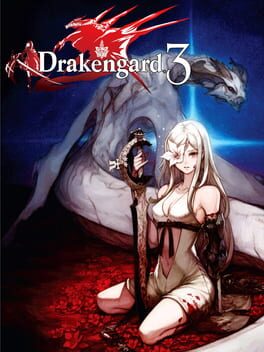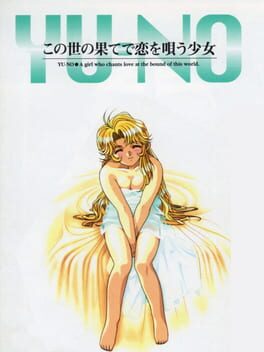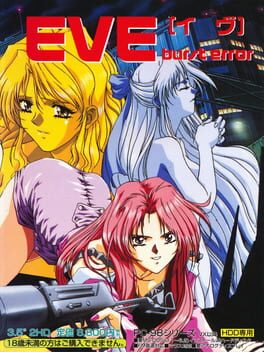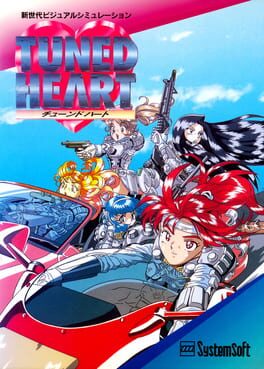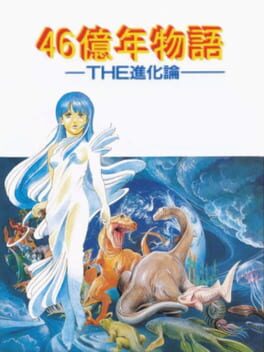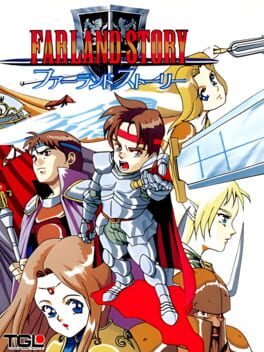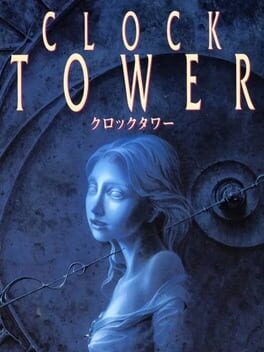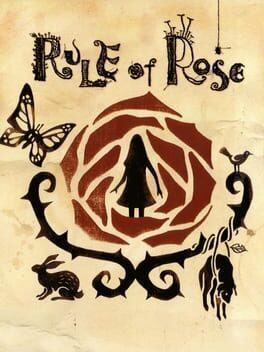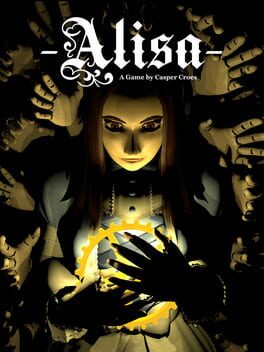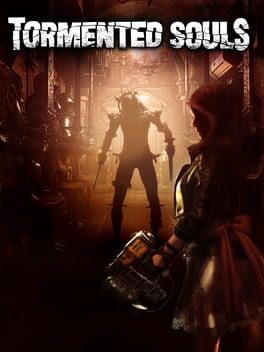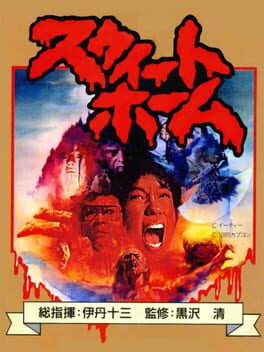Un_Frog
35 reviews liked by Un_Frog
A legendary parody of Metal Gear Solid that surely ranks up there as one of the funniest games ever made. Few games have communicated comedy through their gameplay mechanics as effectively as killing Revolver Ocelot in about 5 seconds by just going into first person mode and shooting him.
Yeah, obviously it's not the way you should play Metal Gear Solid, because it isn't Metal Gear Solid. It's The Twin Snakes. And it's hysterical.
The cutscenes especially are absolutely incredible. If you complain about Snake surfing on a missile you are factually a loser I'm sorry to be the one to break it to you
Yeah, obviously it's not the way you should play Metal Gear Solid, because it isn't Metal Gear Solid. It's The Twin Snakes. And it's hysterical.
The cutscenes especially are absolutely incredible. If you complain about Snake surfing on a missile you are factually a loser I'm sorry to be the one to break it to you
NieR
2010
this isn't really a review so much as it is an emotional plea as to the value and worth of NieR Gestalt. i feel compelled to talk about what made this game so special to me when I played this over 10 years ago now, before NieR becomes completely subsumed underneath the shadow of its vastly more financially successful follow-up. the original nier is an important game to me, and I refuse to let it be forgotten or replaced.
------[a] requiem for smokin' sick style------
the combat is good, actually. and i'm tired of pretending it's not.
maybe it's just because I've spend a disproportionate percentage of my time online hanging with people who think KH2FM and DMC4 are the peak of video games and anything that isn't trying to emulate them is a fundamental failure, but it feels like this is the one stick absolutely everyone beats this game with and it's disappointing.
when Nier hits someone with his sword in this game, there's almost a full second of frame pause as the weapon cleaves into a shade and lets loose abject fountains of blood that paints the environment around the now dismembered spectral body. when he uses magic, he summons a horde of blood spears that obliterate anything they hit. it is one of the most casually violent feeling things in the entire world and it absolutely owns. when this game recontextualises it's violence (refreshingly without falling into "you enjoy the killing" played-out shite), it lands harder than so many other games because of how genuinely violent all this feels, and manages to accomplish it without the cartoonish viscera of something like The Last of Us Part 2.
yes it is stiff and clunky. no, you will not make skillvids of this online. i beg of you, expand your definitions of what makes combat in a game good beyond that narrow field. no other game can be Devil May Cry 4, not even Devil May Cry 4.
------1,312 years [b]efore its time------
representing the satisfying midpoint between the interminable bansky-esqe "makes u think..." philosophy 101 drivel of Automata's lowest points and the insufferable edgelord tendencies of Drakengard 1 & 3 that tended to bury the things about those games that were genuinely interesting, Nier is everything I find enthralling about the DrakenNier games without the things that have ultimately led to me walking away from every other Taro joint feeling disappointed and unfulfilled.
2010 was a really long time ago. NieR came out before The Last of Us, before Bioshock Infinite, before Spec Ops: The Line, before the explosion in indie scene that led to more diverse voices getting a platform on itch.io and steam. maybe taking that into account can help explain why NieR completely changed the way I thought about games. it challenged what i thought video games could be. the way it flirted with different genres and forms was utterly captivating. nier felt like a game from the future or a different dimension. and now it isn't nearly as impressive, sure. it's been mapped out and explained and recapped by people trying to hurry you onto the next, less interesting game. everyone knows about ending D, everyone knows about the drakengard connection, everyone knows about the other routes. but I didn't. when I first played this game, and finishing it unlocked a new game+ that let me hear what the enemies had to say? my tiny 14-year old brain just about exploded, and opened a third eye to just what video games could do. maybe for you the game that did this was killer7, or deus ex, or undertale, or breath of the wild. for me it was NieR.
in a way, this is the real shame about automata, and the way square enix responded to its success. the game itself is fine, good even. but the way in which people have used it to turn this game into a footnote that should be skipped, skimmed, or otherwise treated as a mere prelude to the game about the robots in fetish outfits saying "wot if ur mum ran on batteries and went on about the ship of theseus" is profoundly neglectful.
yes i am being reductive and mean about NieR: Automata. if squeenix wanted me to not do that, they should have been less reductive about this game.
------the [c]ase for papa nier------
when people talk about the story of NieR, it's often the subversive or Lore aspects that are talked about the most, about the details of Project Gestalt and it's implications for the themes and what the ending means and things like that. which is all fine and good. but i think it's worth noting that NieR also just has one of the best parties I've ever seen in a JRPG. weiss. emil. kaine. kaine, most of all. they're all wonderfully well-drawn, complex, and deeply human characters, complete misfits that find a place to fit in each other. it's one of the core appeals of the entire genre and NieR just knocks it out of the park, and (setting aside the fact that I think the game has much more engaging things to say on the subject of parental love and it's toxicity than sibling love) that's why Father Nier matters so much.
because brother nier? he fits. he's a young jrpg hero on his way to save his sister with his party in tow. this is a darkness to him, but he is, overwhelmingly, the normalcy at the heart of the cast. he fits in as a JRPG hero. father nier, though? father nier doesn't fit. nothing about him fits. he's a hideous trollman who makes incredibly earnest speeches about friendship. he is a world-weary and cynical man who takes time to garden and help everyone in his home village. he is just as much of a misfit as the rest of this party, and thus, fits in with them perfectly. he makes this collection of off-the-wall characters, these people that fit absolutely nowhere else in this world, into a family that finds themselves, a place to belong, and people they love, in each other. he is what drives this party dynamic to heights that spoke to me in ways that i didn't really understand at the time, and that is why he will always matter to me.
brother nier is fine. he's cool. he's got some of his own stuff that's interesting.
but he's not my papa nier.
------[a] requiem for smokin' sick style------
the combat is good, actually. and i'm tired of pretending it's not.
maybe it's just because I've spend a disproportionate percentage of my time online hanging with people who think KH2FM and DMC4 are the peak of video games and anything that isn't trying to emulate them is a fundamental failure, but it feels like this is the one stick absolutely everyone beats this game with and it's disappointing.
when Nier hits someone with his sword in this game, there's almost a full second of frame pause as the weapon cleaves into a shade and lets loose abject fountains of blood that paints the environment around the now dismembered spectral body. when he uses magic, he summons a horde of blood spears that obliterate anything they hit. it is one of the most casually violent feeling things in the entire world and it absolutely owns. when this game recontextualises it's violence (refreshingly without falling into "you enjoy the killing" played-out shite), it lands harder than so many other games because of how genuinely violent all this feels, and manages to accomplish it without the cartoonish viscera of something like The Last of Us Part 2.
yes it is stiff and clunky. no, you will not make skillvids of this online. i beg of you, expand your definitions of what makes combat in a game good beyond that narrow field. no other game can be Devil May Cry 4, not even Devil May Cry 4.
------1,312 years [b]efore its time------
representing the satisfying midpoint between the interminable bansky-esqe "makes u think..." philosophy 101 drivel of Automata's lowest points and the insufferable edgelord tendencies of Drakengard 1 & 3 that tended to bury the things about those games that were genuinely interesting, Nier is everything I find enthralling about the DrakenNier games without the things that have ultimately led to me walking away from every other Taro joint feeling disappointed and unfulfilled.
2010 was a really long time ago. NieR came out before The Last of Us, before Bioshock Infinite, before Spec Ops: The Line, before the explosion in indie scene that led to more diverse voices getting a platform on itch.io and steam. maybe taking that into account can help explain why NieR completely changed the way I thought about games. it challenged what i thought video games could be. the way it flirted with different genres and forms was utterly captivating. nier felt like a game from the future or a different dimension. and now it isn't nearly as impressive, sure. it's been mapped out and explained and recapped by people trying to hurry you onto the next, less interesting game. everyone knows about ending D, everyone knows about the drakengard connection, everyone knows about the other routes. but I didn't. when I first played this game, and finishing it unlocked a new game+ that let me hear what the enemies had to say? my tiny 14-year old brain just about exploded, and opened a third eye to just what video games could do. maybe for you the game that did this was killer7, or deus ex, or undertale, or breath of the wild. for me it was NieR.
in a way, this is the real shame about automata, and the way square enix responded to its success. the game itself is fine, good even. but the way in which people have used it to turn this game into a footnote that should be skipped, skimmed, or otherwise treated as a mere prelude to the game about the robots in fetish outfits saying "wot if ur mum ran on batteries and went on about the ship of theseus" is profoundly neglectful.
yes i am being reductive and mean about NieR: Automata. if squeenix wanted me to not do that, they should have been less reductive about this game.
------the [c]ase for papa nier------
when people talk about the story of NieR, it's often the subversive or Lore aspects that are talked about the most, about the details of Project Gestalt and it's implications for the themes and what the ending means and things like that. which is all fine and good. but i think it's worth noting that NieR also just has one of the best parties I've ever seen in a JRPG. weiss. emil. kaine. kaine, most of all. they're all wonderfully well-drawn, complex, and deeply human characters, complete misfits that find a place to fit in each other. it's one of the core appeals of the entire genre and NieR just knocks it out of the park, and (setting aside the fact that I think the game has much more engaging things to say on the subject of parental love and it's toxicity than sibling love) that's why Father Nier matters so much.
because brother nier? he fits. he's a young jrpg hero on his way to save his sister with his party in tow. this is a darkness to him, but he is, overwhelmingly, the normalcy at the heart of the cast. he fits in as a JRPG hero. father nier, though? father nier doesn't fit. nothing about him fits. he's a hideous trollman who makes incredibly earnest speeches about friendship. he is a world-weary and cynical man who takes time to garden and help everyone in his home village. he is just as much of a misfit as the rest of this party, and thus, fits in with them perfectly. he makes this collection of off-the-wall characters, these people that fit absolutely nowhere else in this world, into a family that finds themselves, a place to belong, and people they love, in each other. he is what drives this party dynamic to heights that spoke to me in ways that i didn't really understand at the time, and that is why he will always matter to me.
brother nier is fine. he's cool. he's got some of his own stuff that's interesting.
but he's not my papa nier.
to disparage 3rd strike is often blasphemy in fighting game circles. for many, this is the ur-fighting game, a dizzying concoction of tight and expressionist mechanics, gorgeous spritework, and a dnb soundtrack that is absolutely fuego. it even has that little fundamental spice that all premier fighting games must aspire to possess: a disregard for balance. most modern titles would never dare nerf a character so significantly purely for thematic purposes, but then again, no modern title would ever think to include characters like twelve or chun-li (edit: this is a patent lie. tekken 7 season 3 had both leroy and fahkumram.)
still, what makes this game fascinating years on has little to do with any of its individual elements. fundamentally, it's the mood. it's a game that feels as though it was made on the verge of something great and unknown, and is one of those rare few titles i'll posit encapsulates a certain je ne sais quois, a snapshot of a particular zeitgeist heading into a new millennium. sure, you can point to the more overt references and stylings - strong WWF influence, character select rap, yang, yun, and q are maybe the most 90s characters ever designed, the illuminati as an antagonistic force and its seemingly benevolent villain - but more importantly, it's a composite of characters who are just wandering, trying to find themselves in some instances or seeking mastery in others. there's no pressing tournament to attend to, and even the machinations of the literal illuminati are vestigial, with its plotting mostly centered around biblical rivalry between tyrants. street fighter 3 was originally just about a new generation - itself neatly characterized as 'of its time' - but 3rd strike flips the script. rather than establishing new legends, this game is about characters unsure about what the future entails, about what their next move should be, about what it even means to continue fighting - they waver, they fail, they practice, they move on. even though these ideas are reflected in little moments (chun-li teaching children to put up their dukes, elena reflecting on her journey and her future with a pen pal, alex losing to ryu but refusing to back down),even just aesthetically this theme is completely overpowering - its what imbues 3rd strike with a kind of melancholic ambience, but also what fuels the players' determination to prove themselves.
even better, to this day, this is still the only street fighter that is aesthetically unique to itself. street fighter 2 features worldly caricatures, alpha often feels like it lacks confidence or that it's missing something, 4 is nostalgic pageantry, and 5 is a slipshod mess of meaningless platitudes with no direction. this is the closest capcom ever got to imbuing their flagship franchise with unique stylings; it's something that actually has character and personality comparable to an SNK title. this, probably more than the joy of hitting a parry, setting up aegis reflectors, or getting in my opponent's head, is probably what keeps me coming back. fight for the future, so what's it gonna be, the third strike y'all it's street fighter 3
still, what makes this game fascinating years on has little to do with any of its individual elements. fundamentally, it's the mood. it's a game that feels as though it was made on the verge of something great and unknown, and is one of those rare few titles i'll posit encapsulates a certain je ne sais quois, a snapshot of a particular zeitgeist heading into a new millennium. sure, you can point to the more overt references and stylings - strong WWF influence, character select rap, yang, yun, and q are maybe the most 90s characters ever designed, the illuminati as an antagonistic force and its seemingly benevolent villain - but more importantly, it's a composite of characters who are just wandering, trying to find themselves in some instances or seeking mastery in others. there's no pressing tournament to attend to, and even the machinations of the literal illuminati are vestigial, with its plotting mostly centered around biblical rivalry between tyrants. street fighter 3 was originally just about a new generation - itself neatly characterized as 'of its time' - but 3rd strike flips the script. rather than establishing new legends, this game is about characters unsure about what the future entails, about what their next move should be, about what it even means to continue fighting - they waver, they fail, they practice, they move on. even though these ideas are reflected in little moments (chun-li teaching children to put up their dukes, elena reflecting on her journey and her future with a pen pal, alex losing to ryu but refusing to back down),even just aesthetically this theme is completely overpowering - its what imbues 3rd strike with a kind of melancholic ambience, but also what fuels the players' determination to prove themselves.
even better, to this day, this is still the only street fighter that is aesthetically unique to itself. street fighter 2 features worldly caricatures, alpha often feels like it lacks confidence or that it's missing something, 4 is nostalgic pageantry, and 5 is a slipshod mess of meaningless platitudes with no direction. this is the closest capcom ever got to imbuing their flagship franchise with unique stylings; it's something that actually has character and personality comparable to an SNK title. this, probably more than the joy of hitting a parry, setting up aegis reflectors, or getting in my opponent's head, is probably what keeps me coming back. fight for the future, so what's it gonna be, the third strike y'all it's street fighter 3
NieR Re[in]carnation
2021
thesis: yoko taro is often listed among the foremost auteurs of the medium but the reality is his strengths lie in a kind of prototypical 'video game' method of work, borne out of necessity, that prioritizes collaboration between a consistent set of screenwriters, an unorthodox style of design targeting emotional resonance, and a plethora of unique flourishes specifically aimed at facilitating the empathy, immersion, and connection of its players (researching drakengard 1s development makes this especially apparent - it's arguably not even a yoko taro game in the usually defined sense of the term). his works, when in production, are thwarted frequently by compromise, limitation, and sacrifice - stumbling blocks, all in service of eventually reflecting a well-trodden title which charms on the virtues of its rustic artistry. wear and tear and a heart of gold. this style of development, marked by haste and experimentation and fueled by pure zeal and love for the craft, perhaps reveals why the pillars of video games, the codified monomythic genres and the primordial archetypes and the frequent allusions to popular work, so often impress themselves upon yoko taro games, and why so often his work succeeds in connecting to people where other talent may struggle. the video game of it all, if you will. incidentally, this collaborative style allows for a large breadth of potential interpretation and analysis afforded towards his work, and ive long maintained that a YT game is at its most interesting when it's not about what he intended for it to be about. did the tragedies in nier gestalt sometimes fall flat for you? me too! thankfully that's not what the game is about, at least not to me. in sum: the work of many, each willing and able to leave a fingerprint on the mosaic of development, enriches the product in the long-run, creating a full-bodied textured work of art and contributing immensely to the humanity at the core of these games. if any given chord strikes you as dull, a separate melody will enchant you - that's the nature of YT's games. they're artisan because of what they value and because of how they achieve their mission statement, and especially because of their passion, always demonstrated by the little details in these games. passion will always reveal itself, but so too will a dearth of passion reveal itself.
proof: nier re[in]carnation
if these games worked because of a certain je ne sais quois shared by the collaborative nature of a team in a trying work environment, i don't think my prospective next project would be a game in an exploitative genre where a new team of writers handled an endless barrage of one-note vignettes while YT sat back, nodded halfheartedly at his desk, and tried to string every vignette together using an overarching plot catering to obsessive drakennier fans. just my two cents
proof: nier re[in]carnation
if these games worked because of a certain je ne sais quois shared by the collaborative nature of a team in a trying work environment, i don't think my prospective next project would be a game in an exploitative genre where a new team of writers handled an endless barrage of one-note vignettes while YT sat back, nodded halfheartedly at his desk, and tried to string every vignette together using an overarching plot catering to obsessive drakennier fans. just my two cents
Signalis
2022
Certain video games don’t necessarily require innovation, originality or trailblazing to stand out from the crowd as works to be celebrated and classics to be. Specifically, titles in the indie scene such as Hyper Light Drifter, Dusk or ZeroRanger have proven time and time again that execution and presentation can far outweigh the well from which their ideas are stolen from, and whose aesthetic perfectionism and gameplay polish and varnish ultimately become the craft to be praised.
Signalis is one such title, unabashedly putting on full display its 5th gen survival horror roots and influences, both visually and mechanically, with a sci-fi coat of paint that covers it with a collage of homages to groundbreaking works that range from Evangelion, Blade Runner and Blame!, all the way to Tarkosvsky, Lynch and Lovecraft. Marrying Resident Evil’s resource management tension with Silent Hill’s purgatorial psychological assault lends Signalis the opportunity to evoke an unparalleled lyrical and dreamlike experience that never sacrifices the tenets from which those series made their name from, perfecting the art of environmental storytelling and backtracking revelatory dread.
In an age of understandably unsubtle and overbearing dystopian nightmares presented through art, Signalis instead places much of its totalitarian regime imagery into the background of its setting, visuals, lore and puzzles, making its love story of inevitable tragedy the central core of the narrative. The retrofuturism of Signalis serves not only as an artistic pursuit for tactile and analogue nostalgia, but also as a tool to convey the priorities of a fascist empire that has consciously dwindled the mental liberty, self-expression and unconformity of the main characters now stuck in an ever perpetuating restrictive world of redundancy and self-mutilation, doomed to a slow, empty death.
The cohesiveness in which Signalis threads its story, gameplay and art design is ultimately the game’s greatest feat. It elevates an otherwise universal and familiar language to new heights, thanks to a talented dev duo that understands the strengths of their interests and influences and manages to funnel into a production effort that would put many triple A endeavors to shame. Can’t wait for what rose-engine has in store next, this is a homerun already.
Signalis is one such title, unabashedly putting on full display its 5th gen survival horror roots and influences, both visually and mechanically, with a sci-fi coat of paint that covers it with a collage of homages to groundbreaking works that range from Evangelion, Blade Runner and Blame!, all the way to Tarkosvsky, Lynch and Lovecraft. Marrying Resident Evil’s resource management tension with Silent Hill’s purgatorial psychological assault lends Signalis the opportunity to evoke an unparalleled lyrical and dreamlike experience that never sacrifices the tenets from which those series made their name from, perfecting the art of environmental storytelling and backtracking revelatory dread.
In an age of understandably unsubtle and overbearing dystopian nightmares presented through art, Signalis instead places much of its totalitarian regime imagery into the background of its setting, visuals, lore and puzzles, making its love story of inevitable tragedy the central core of the narrative. The retrofuturism of Signalis serves not only as an artistic pursuit for tactile and analogue nostalgia, but also as a tool to convey the priorities of a fascist empire that has consciously dwindled the mental liberty, self-expression and unconformity of the main characters now stuck in an ever perpetuating restrictive world of redundancy and self-mutilation, doomed to a slow, empty death.
The cohesiveness in which Signalis threads its story, gameplay and art design is ultimately the game’s greatest feat. It elevates an otherwise universal and familiar language to new heights, thanks to a talented dev duo that understands the strengths of their interests and influences and manages to funnel into a production effort that would put many triple A endeavors to shame. Can’t wait for what rose-engine has in store next, this is a homerun already.
Drakengard 3
2013
don't care that the frame rate is awful; don't care that the combat is asinine; don't care that the game is unpolished, janky, ugly, and poorly considered in every respect; don't care that it was subject to predatory dlc; don't care that accord's requests are emblematic of some of the worst there is in side quest design; don't care don't care don't care
what i do care about is that this is the ultimate manifestation of YT's disinclination to work in games juxtaposed with his earnest belief in the medium as a vessel for greater things. in his grimmest failure, he finds light at the end of the tunnel. an astonishing exercise in empathy generation, one of the best finales in a game, and the only one of yoko taro's works that makes great use of backwards scripting + sequential playthroughs
what i do care about is that this is the ultimate manifestation of YT's disinclination to work in games juxtaposed with his earnest belief in the medium as a vessel for greater things. in his grimmest failure, he finds light at the end of the tunnel. an astonishing exercise in empathy generation, one of the best finales in a game, and the only one of yoko taro's works that makes great use of backwards scripting + sequential playthroughs
Portal with RTX
2022
this is utterly grim, nvidia rtx remix is to gaming what ai generated images are to art. the aesthetic of portal is completely neutered in favor of smudgy hi-res textures and overblown lighting.
not to mention that the new visuals actively detriment the original game's visual guiding and design!!! i've replayed this game a ton and i actually couldn't tell where to go sometimes because the visual clutter introduced by raytracing was so awful.
how excellent that nvidia has blessed us with the ability to make games look like unreal engine nintendo hire this man type shit.
not to mention that the new visuals actively detriment the original game's visual guiding and design!!! i've replayed this game a ton and i actually couldn't tell where to go sometimes because the visual clutter introduced by raytracing was so awful.
how excellent that nvidia has blessed us with the ability to make games look like unreal engine nintendo hire this man type shit.
Drakengard
2003
this game requires no introduction anymore so i'm not beating around the bush. drakengard has been on my mind a fair bit recently - on the off chance you'll forgive a second log i think it's worth examining some of what the title accomplishes uniquely well, or what it's able to achieve with respect to the various titles that it's in conversation with. first of all: there's nothing quite as flatline-inducing or revealing of the author's own tendencies as reading that drakengard was intentionally poorly designed, a commonly held idea in various hobbyist communities frustratingly stemming just as often from its supporters as from its detractors. not only is this a frightfully pedantic and dull reduction of the text - it's also just an elaborately constructed fiction masking deeper truths. for instance, i think it's plain as day our burgeoning critical language still struggles with titles seemingly antithetical to traditional enjoyment, and are only able to escape from suffocating evaluative lexicon through irony or genre labels. survival horror isn't normally 'fun' & people appear willing to understand this so the genre gets a normative pass en masse, although it seems worth mentioning that the longer they exist in the public eye the more their mechanical frameworks get totally demystified by the public, arguably reducing them to vehicles for pleasure and gratification anyways, resident evil being the prime example.
drakengard, of course, isn't survival horror. it's largely a musou with some horror trappings, but it's rather plain about its affectation. however, because the traditional 'game' part of it is in such conflict with its aesthetic, we end up with the idea that this dissonance is a result of intentionally languid, engineered dissatisfaction. oh wow that wacky yoko taro wanted you to feel bad so he made his debut game bad. bzzzzt. wrong. square enix wanted a commercial success with drakengard. if they didn't, they wouldn't have requested that a project starting out as a simple remix of ace combat (owing massive inspiration to electrosphere in particular, another game that combines peerless arcade bluster with bleak narrative proceedings) would incorporate elements of its contemporary blockbuster peer, dynasty warriors. none of this is to say that drakengard can't be an awkward game, but it's in large part due to a friction with cavia's inexperience/lack of technical expertise, their attempts at holding true to their initial vision for the project, and square enix being desperate for a worthy competitor to koei tecmo's success.
here's where i'll stake a claim on something potentially contentious and risible. on the basis of the title's struggles in production & development, it is somewhat shocking that drakengard is not just 'not bad', but is a totally competent musou game. given the milieu in which it released, you might even dare to call it 'good', or 'well-made'. i'll double down with something absolutely no one wants to hear: most people have no point of reference because musou is rarely put in its historic context, appreciated for its strengths, or even, broadly speaking, played. disregarding popular experimental offshoot licensed games which carry their own unique magnetism, dynasty warriors has an especially prevalent stigma in contemporary action game circles, and few seem willing to return to reevaluate the franchise. if we accept this as the case, we can begin to understand why nostalgia is the primary driver of fondness for early musou, and why you always hear dynasty warriors 3 is the best one. 'load of bull', you say, 'drakengard is not good', you say, 'dynasty warriors sold millions and is beloved for inventing the drama; surely it's better', you say, but take a look at these admittedly small sample sizes (evidence A and evidence B) and you tell me which is actually the niche ip at present. one of these broader game worlds got a FFXIV collaboration. it was not dynasty warriors.
anyways the idea that drakengard could be a respected peer to dynasty warriors - or even, perhaps, better - is not ahistorical. drakengard came out in 2003, only a few months after the release of dynasty warriors 4. by this point in the dynasty warriors timeline, your only sources of inspiration for the musou canon are dynasty warrior 2 and dynasty warriors 3. they're fine games for what they are - content-rich, pop recontextualizations of romance of the three kingdoms that fold the intense political drama, grandiose character dynamics, and poeticizing of feudal history intrinsic to the novel and morphs them into larger-than-life battles of one against one hundred. it works for that series, but having played dynasty warriors 3, it's also very simply orchestrated. DW3 is kinetic and energetic, sure, but form is not function. as a still nascent series, DW3 has yet to experiment with elements that would come to define later entries, such as a strong emphasis on field management - its presence in 3 is largely muted and, dependent upon your stats, can often be negated. it is mostly a game of fulfilling your objectives, grinding up your stats, and engaging in undemanding combat pulling the same strong combo strings against some unique generals and a multitude of carbon copy generic ones. and i happen to appreciate it for what it is, but there is no question in my mind if you slotted that exact same mechanical framework into drakengard's tone and setting, it would be similarly deemed bad on purpose.
other than its tone what does drakengard do differently from this purely mechanical perspective? honestly, not too much from DW3! archers are still often priority targets, because if you don't prioritize them you will get knocked off yourhorse dragon. mission structure is usually quite similar, arguably with a bit less back and forth. combos require virtually the exact same input. the camera in both games is kind of fucked up. aside from abstruse unlock requirements and a...unique, system of progression, the biggest differences are mostly relegated to additions rather than subtractions. there are more enemy designs than just grunt soldiers. you can dodge now. the game is weapon-driven rather than character-driven ala DW3, which allows for its own form of unique experimentation. the soundtrack is excellent, i'm not accepting complaints. to aid in breaking up the pace, there are aerial missions that play somewhat comparably to panzer dragoon on-rail segments which are actually quite fun; likewise, the hybrid missions allow for angelus to be used as a means of offence in ground warfare and rain hellfire from above. it keeps things relatively varied. there's no troops to manage because caim is fighting a losing war and willingly formed a pact with the only being capable of potentially turning the tides, and the game is content to use the musou form to communicate ideas about caim and angelus to great effect.
of course, it's the narrative which gives drakengard a lot of its greatest texture (and is also demonstrative of its greatest strengths and appeals as a DW clone), but we can save discussion of that for some other time; for now it's more important for me to say that it's not quite the outright condemnation of violence through ludology that so many claim it is (it's far more interested in more subtle forms of violence than the explicit and ceaseless murder it depicts anyways). really, this was just a self-indulgent exercise in placing drakengard in its historic context once and for all, away from all the retrospectives it's been getting as a result of nier's runaway success. drakengard is a game that won't be for most, but it's a game that's lingered in my memory long since i first played it. it takes an, at the time, relatively new genre, and through sheer passion and dedication spins it into a uniquely transgressive idea while still remaining an enjoyable title to let unfold. if it feels numbing or meditative, that's more or less the exact emotional resonance that something like DW3 is targeting - drakengard just uses it to achieve more things than a sense of gratifying white noise. it remains peerless because of all of its contradictions, because of how messy and thorny it is as a game, and because we'll never see anything approaching this utterly unique interplay of emotional rhythms and macabre, uncanny storytelling wearing the skin of its crowdpleasing predecessors ever again.
drakengard, of course, isn't survival horror. it's largely a musou with some horror trappings, but it's rather plain about its affectation. however, because the traditional 'game' part of it is in such conflict with its aesthetic, we end up with the idea that this dissonance is a result of intentionally languid, engineered dissatisfaction. oh wow that wacky yoko taro wanted you to feel bad so he made his debut game bad. bzzzzt. wrong. square enix wanted a commercial success with drakengard. if they didn't, they wouldn't have requested that a project starting out as a simple remix of ace combat (owing massive inspiration to electrosphere in particular, another game that combines peerless arcade bluster with bleak narrative proceedings) would incorporate elements of its contemporary blockbuster peer, dynasty warriors. none of this is to say that drakengard can't be an awkward game, but it's in large part due to a friction with cavia's inexperience/lack of technical expertise, their attempts at holding true to their initial vision for the project, and square enix being desperate for a worthy competitor to koei tecmo's success.
here's where i'll stake a claim on something potentially contentious and risible. on the basis of the title's struggles in production & development, it is somewhat shocking that drakengard is not just 'not bad', but is a totally competent musou game. given the milieu in which it released, you might even dare to call it 'good', or 'well-made'. i'll double down with something absolutely no one wants to hear: most people have no point of reference because musou is rarely put in its historic context, appreciated for its strengths, or even, broadly speaking, played. disregarding popular experimental offshoot licensed games which carry their own unique magnetism, dynasty warriors has an especially prevalent stigma in contemporary action game circles, and few seem willing to return to reevaluate the franchise. if we accept this as the case, we can begin to understand why nostalgia is the primary driver of fondness for early musou, and why you always hear dynasty warriors 3 is the best one. 'load of bull', you say, 'drakengard is not good', you say, 'dynasty warriors sold millions and is beloved for inventing the drama; surely it's better', you say, but take a look at these admittedly small sample sizes (evidence A and evidence B) and you tell me which is actually the niche ip at present. one of these broader game worlds got a FFXIV collaboration. it was not dynasty warriors.
anyways the idea that drakengard could be a respected peer to dynasty warriors - or even, perhaps, better - is not ahistorical. drakengard came out in 2003, only a few months after the release of dynasty warriors 4. by this point in the dynasty warriors timeline, your only sources of inspiration for the musou canon are dynasty warrior 2 and dynasty warriors 3. they're fine games for what they are - content-rich, pop recontextualizations of romance of the three kingdoms that fold the intense political drama, grandiose character dynamics, and poeticizing of feudal history intrinsic to the novel and morphs them into larger-than-life battles of one against one hundred. it works for that series, but having played dynasty warriors 3, it's also very simply orchestrated. DW3 is kinetic and energetic, sure, but form is not function. as a still nascent series, DW3 has yet to experiment with elements that would come to define later entries, such as a strong emphasis on field management - its presence in 3 is largely muted and, dependent upon your stats, can often be negated. it is mostly a game of fulfilling your objectives, grinding up your stats, and engaging in undemanding combat pulling the same strong combo strings against some unique generals and a multitude of carbon copy generic ones. and i happen to appreciate it for what it is, but there is no question in my mind if you slotted that exact same mechanical framework into drakengard's tone and setting, it would be similarly deemed bad on purpose.
other than its tone what does drakengard do differently from this purely mechanical perspective? honestly, not too much from DW3! archers are still often priority targets, because if you don't prioritize them you will get knocked off your
of course, it's the narrative which gives drakengard a lot of its greatest texture (and is also demonstrative of its greatest strengths and appeals as a DW clone), but we can save discussion of that for some other time; for now it's more important for me to say that it's not quite the outright condemnation of violence through ludology that so many claim it is (it's far more interested in more subtle forms of violence than the explicit and ceaseless murder it depicts anyways). really, this was just a self-indulgent exercise in placing drakengard in its historic context once and for all, away from all the retrospectives it's been getting as a result of nier's runaway success. drakengard is a game that won't be for most, but it's a game that's lingered in my memory long since i first played it. it takes an, at the time, relatively new genre, and through sheer passion and dedication spins it into a uniquely transgressive idea while still remaining an enjoyable title to let unfold. if it feels numbing or meditative, that's more or less the exact emotional resonance that something like DW3 is targeting - drakengard just uses it to achieve more things than a sense of gratifying white noise. it remains peerless because of all of its contradictions, because of how messy and thorny it is as a game, and because we'll never see anything approaching this utterly unique interplay of emotional rhythms and macabre, uncanny storytelling wearing the skin of its crowdpleasing predecessors ever again.
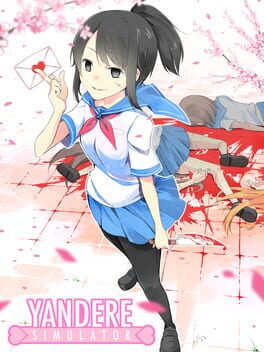
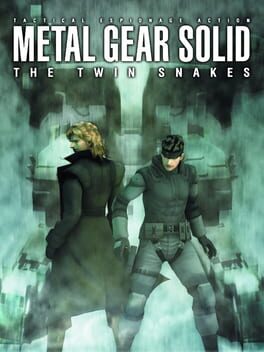
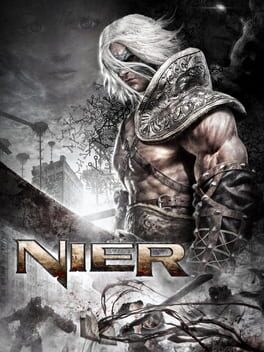
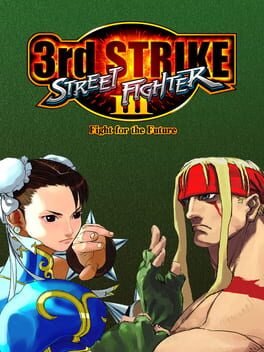
![NieR Re[in]carnation](https://images.igdb.com/igdb/image/upload/t_cover_big/co7bm4.jpg)

